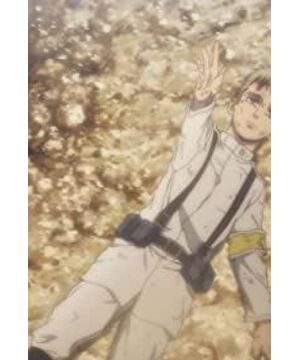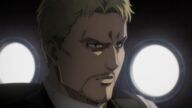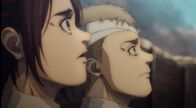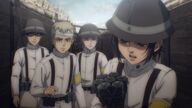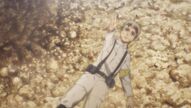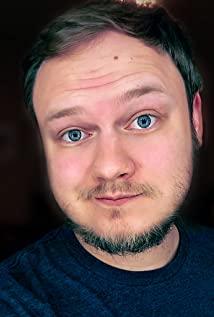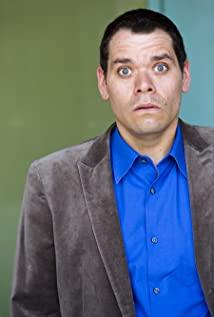Chapter 91-93: Beyond the Sea
Episodes 94-97 Reiner's Memories, the Formation of the Mobius Ring
Chapters 99-100 Declaration of War, Two Trials
Episodes 101-105: The Marais Raid, a battle without a winner
Episodes 106-108: The underrated leader Han Ji, the road that gradually forks
"Giant" has taken a major leap in content depth from the fourth season (the comic "Marai") - the author discusses the difficulty of our time by telling the conflict between the world and the Parade Island where the protagonists are located. The problem to be solved - the global turn to the right, the rise of nationalism in various countries, and the increasingly chaotic and conflicting world that envelops everyone in it, and moves together into an unpredictable future. If the previous plots have been shocking enough and reversing enough, the plot at the beginning of "Marais" is more like overwhelming, allowing readers to experience the feeling of being swept away and being abused to the point of breathlessness. Entering the abyss of tragedy, but indulging in it and unable to extricate oneself, this is probably the charm of the tragic epic.
It is also from this season that "Giant" has transformed from a "very wonderful comic" to "a work that can be compared to world famous books" in my mind. Although Isayama's attempt made many people dissatisfied - many readers began to be more and more dissatisfied with the trend of the plot after experiencing great shock and sadness (and therefore many people felt that "Giant" was unfinished). Readers accuse Isayama - he is incapable of grasping such a complex and grand plot; he only asks questions but does not give perfect solutions; he only digs holes and pretends to be high, but does not explain many details in place... This may be the case when a work starts out in a popular way, but its essence is a realist "human tragedy". What the public expects to see is a film and television work in which the protagonist creates miracles. What they want is the kind of movie viewing experience where good and evil are clear, and they can be accused of everything; the result is that in "Giant", all the characters are like suffering in the real world. Little people who struggle and get no reward, and the harder the characters try, the more they go to tragedy together. Why is this happening? To a certain extent, the chaos and disaster depicted in "Giant" is like the history of human beings in the twentieth century - revolutions, wars, bloodshed and disputes take turns, and everyone hopes to break the history on the path they think is right. The result is often that a group of people do bad things with good intentions, and the revolution will change the flavor. It can be said that to this day, the tearing and dissatisfaction caused by "Giant" is still a certain portrayal of reality. The reason why it has caused such a big dispute in China is largely because many readers have self-contradictory values but do not. self-awareness.
From my point of view, although I have always praised "Giant" as a masterpiece, I have to admit that the author inevitably has certain limitations in the process of creating the fourth season. However, I think the author's limitations are precisely the limitations of every ordinary person trying to understand the world today - in the end, we can't see it clearly, and it's difficult to give the right answer. The greatness of jsc is that it has enough creativity and imagination to outline the unchanging historical logic in this complex world with a fictional story. I'm actually very happy that in this era where entertainment is paramount, there is such a work that discusses serious practical issues in a way that the public likes and hears and provokes readers to think.
For me, every episode of Marais struck me and made me feel like there was something worth discussing. And the content starting from "Marai" is indeed worth combing carefully. Below I will comb through the comics' episodes.
Chapter 91-93: Beyond the Sea
Episode 91 is the first episode of the fourth season of the anime. At the end of the third season, the protagonists finally "learned the truth of the world", but this truth did not bring them any joy. They finally understood the past of their own nation and how broad the world is, but they had to accept the change in their own identity—from the self-confessed "just party" to the "enemy of the whole world". The pride of the past is gone, the ideals of the past have vanished, and there are only infinite crises left in front of them.
And Chapter 91 pushes the time in the comics to four years later, and focuses on the wider world of "the other side of the sea". This sentence allows readers to see that there is also a group of people on the continent "on the other side of the sea". They are of the same ethnicity as the Pao people where the protagonists live, living within high walls, and eager to serve their own The nation finds a way out. However, a nation with the same destiny is torn in two due to different positions, falling into a situation where they are enemies of each other and cannot stand against each other.
Because of the first three seasons, readers have a stronger sense of substitution for the protagonist's party. The national existential crisis faced by the protagonist and the situation of being covetted by the world's powers also aroused the empathy of Chinese readers. Correspondingly, many people increasingly do not understand why the Malai Ai people are discriminated against but voluntarily accept brainwashing and agree with a set of rhetoric of "dedicated to the great motherland", even though the fourth season fully explained the various difficulties faced by the Malai Ai people. And Isayama himself once said that he prefers the roles of Ma Laifang, Reiner and Ani, to the protagonist. Perhaps it is because of their situation that they have more general practical significance - in reality, small individuals actively identify with the power that oppresses them in order to seek a sense of security, and actively abandon their humanity and ego in order to survive, etc. The author obviously pushes this twist of personal behavior to the extreme, arguing that the reality of tiny individuals is imperfect, more complex and real than the idealistic character represented by the much-loved Survey Corps.
This is also the interesting part of "Giant". It portrayed the "minority" in reality, the liberals represented by the Survey Corps, as the protagonists of the first three seasons, and aroused the empathy of the audience. However, the "minority" in reality is often not welcomed by the world (at least in China for now), because they are always bucking the trend out of time. The survey corps in the comics plays this role throughout the story - running outside the wall and knowing the truth of the world when the people inside the wall are safe; have been defeated in the first two seasons until they lost everything In the third season, the king's political chapter was even referred to as a "rebellion object" by the royal power within the wall, and all members were arrested; after that, they experienced a short-lived success - overthrowing the king's power and regaining Maria's kingdom at the cost of almost annihilating the army. wall. As a result, in the fourth season, when the people on the island began to quarrel with the enemy and agreed with the outside world, they began to sing the opposite. Indeed, how can a group of people who pursue the ideal of freedom agree with the narrow nationalism that strives for their right to exist by crushing others, and rationalism itself also determines that most of them are not good at fighting for power and intrigue with others. So in the fourth season, the Survey Corps was unsurprisingly marginalized again. In response to reality, many readers increasingly disagree with the actions and positions of the protagonist group. From here, the positions of many readers began to contradict themselves-they hated the enemy countries with serious nationalist tendencies in the comics, while supporting the Pao people who were also flooded with nationalist sentiments later. The more extreme and contradictory the reader's concept is, the easier it is to be dissatisfied with the comics.
The first three chapters of "Marais" also outline the "world situation". In the first few seasons of the comics, people have been discussing what would happen if modern weapons were used to fight against the power of giants. Technological and military developments are changing with each passing day. The big country Marai, who has been relying on the power of giants to oppress other countries, has really begun to fall into crisis, because the power of giants has gradually become unable to compete with modern weapons. This season, the author took the initiative to disenchant "Giant Power", and from this came a greater existential crisis for the Eldians. Where everyone will go has become a new suspense that makes readers worry.
PS: Obviously, Isayama's creation was inspired by the crisis Japan faced a hundred years ago and the changes in Japanese national psychology before and after World War II. His works can see the shadow of the nation's history everywhere. However, the same crisis is also a common dilemma faced by countries all over the world in the twentieth century. Readers from almost all countries can find the shadow of their own nation in this work. This is probably the great thing about "Giant".
Episodes 94-97 Reiner's Memories, the Formation of the Mobius Ring
In episodes 94-97, the backstory of the trio outside the wall has finally been revealed. In the previous seasons, the betrayal of Reiner, Bertolt, and Annie surprised many people, and their identities suddenly changed from "reliable partners" to "killing demons without mercy". Compared with such a contrasting transformation, what impressed me more was that the three people who chose to betray showed real pain at certain moments. After these three words, readers finally understand the reason for their pain. The author takes Reiner as the protagonist and tells the story from his memory and his perspective.
For Reiner, who had just ended a four-year war and his Warriors returned as heroes, he should have enjoyed a leisurely vacation. However, this "peaceful daily life" has brought him even greater pain. The past and the present are constantly intertwined in front of his eyes, and the images of his betrayed companions and betrayed comrades-in-arms are constantly tormenting him. At the same time, He watched helplessly as the innocent next generation could not wait to plunge headlong into the same fate. And all he can do is continue to act, betray himself every day and live.
I have to admit that Isayama has drawn a lot of brush and ink to shape Reiner (if he can portray all the characters so deeply, maybe "Giant" can continue to rise to a higher level, and readers can better accept the subsequent plots .) Isayama must have an attitude of ridicule and sympathy towards Reiner-he is tall and strong on the outside, a tough guy, but he is very cowardly and incapable of confronting reality; Completely alienated, and finally got himself to the point of schizophrenia; he inherited the giant armor of hard armor, but he could not escape the fate of being smashed in every battle (in Jean's words, his broken giant can only beat He likes Heath, but he probably hasn't even said a word to others, and will only secretly keep it in his heart from beginning to end... However, the contradictions in Reiner are so real, I have Posted a post:
Let's talk about why everyone has a special empathy with Reiner
To put it simply, everyone sees their own shadow in Reiner - the image of a mediocre, involuntary, drifting, and repeatedly beaten by society.
PS: Regarding Reiner, many people felt that the scene in which he heard the letter from Heath in the last episode did not fit his image, which surprised me a bit. This scene is a bit outrageous indeed, but it still makes me a little relieved - Reiner finally doesn't have to live in fear and guilt every day, and finally doesn't have to play any role.
At the same time, the three episodes from 94 to 97 reproduce the magic strokes, and the author creates miracles in both the use of the mirror and the telling of the story. The "Reiner Swallows the Gun" scene uses fragmented footage to show the erosion of memories on Reiner, pushing his pain and guilt to the extreme. The experience of the trio outside the wall brings out "the other side of the story". The author finally reproduced several shots in the first season of "Attack on Titan" from their perspective, including the most classic first scene - the super giant crawling on the city wall with his head exposed, and the three main characters in the wall who were frightened. Group view screen. The fate of the aggressor and the invaded are connected in a strange way, like the two ends of a Mobius ring. This bodes well for the identities of both parties to happen again soon. Sure enough, it was pulled back to the present by Reiner's memory. The protagonist Alan, who had not appeared for a long time, appeared in Marais. He gave people a very different feeling than before, and everything indicated that a violent storm was coming.
From the beginning of these few words in "Giant", the fate of the characters has gradually become a strong destiny. Allen met the young Falk in the Malai Erdian's containment area, and his appearance completely changed Falk's fate; just as Falk's uncle changed Allen's father Grisha's many years ago. Same fate. Ultimately, Falk acts as a "line" that connects Alan and Reiner. Allen met his grandfather by chance in the hospital. The grandfather recalled what happened to Allen's father and suddenly let out a whimper - his actions to protect his son eventually pushed his son into the abyss, which seemed to portend similar tragedies to repeat. At this time, Allen also stated that he "saw hell and actively pushed himself into hell". Although he did not know whether the end of hell was hope or another hell, he still decided to go all the way and bear his own burden. Choose the serving size that brings the result.
Chapters 99-100 Declaration of War, Two Trials
Regarding these two words, I was very angry when the animation came out, because I thought I could see the famous scene like "I Kaitachao", but I was fooled by Mappa. So I wrote a post to analyze "Why the fifth episode animation didn't have the epic sense of the comics." The biggest shock of episodes 99 to 100 is the plot itself, Willie's majestic speech and the meeting between Allen and Reiner for the first time in four years. Willie's speech was on the bright side, and the audience included nobles from around the world, high-ranking military officers in Marais, and Eldia residents of the concentration camp. Originally, a group of people who had different positions, great differences in status, and even fought to the death not long ago gathered together. What kind of speech are they looking forward to? It is conceivable that Willie's speech itself must be ups and downs and extremely infectious (the animation handles this very badly), because he not only wants to overthrow "the history of the predecessors" and change everyone's perception, but also On this basis, the whole world is drawn to the side of Marais to the maximum extent, and all the crimes are blamed on Parady Island and the island's "devil" Alan Yeager.
And Willie also knew that it would be difficult to do this by his speech alone, and he had to have a heavier stake in his hand, which was the life of himself, the audience of the speech, and the Eldians in the containment area. The conversation between Magath and Willie before the speech at the beginning of Chapter 100 reveals this - it turns out that they had already discovered that the enemy had infiltrated, and they both expected that the enemy was likely to attack during the speech, but the two decided to follow the plan. Celebrate. This plot greatly increases the complexity of the plot, the layering of the characters and the depth of the work - Willie's speech is using human nature, but he is really doing it with the mentality of dying. Magath knew everything, and he condoned the attack, to some extent for ulterior motives, that is, to liquidate the senior generals in the Marais army and seize military power through this attack, but he did reveal his concern for himself. Feelings of guilt and sadness about the imminent consequences of letting go. The most ironic thing is that the two finally reached some kind of complicity-Willie admitted in his speech that Marais and the Dyba family joined forces and used the Eldians. He sincerely confessed history and cried about the despicableness of his family. But all he did was join forces again with Magath, who represented Marais, and used the lives of the Eldians in the containment area and the nobles from all over the world as a bargaining chip to increase their persuasiveness. Hence the classic scene: Magath admits that Eldia is indeed the descendant of demons, and we (the Marais) are indeed demons. PS: However, the subsequent episodes showed that they overestimated themselves and underestimated their opponents.
Of course, more important than Willie's speech is the interaction between Allen and Reiner at the same time. The two meet in a dark and cramped basement, in stark contrast to Willie's speech. Reiner's personal tragedy at this meeting is at its peak, all his sins are finally judged, his guilt and remorse are finally answered - he sees Alan's arrival as his own judgment, but he still asks Allen asked "Why are you here?", when Allen replied "same as you", Reiner instantly collapsed. He realizes what Ellen is about to do, everything is like reincarnation, this is the sin initiated by him, the sin he can't get rid of even if he dies. At this time, Allen, although he emphasized "the same as you", obviously his mood was different from that of Reiner at that time. Reiner and the others who attacked the city wall at the time were only eleven or twelve years old and "knowing nothing". Ellen, who came outside the wall, already knew that the residents outside the wall were the same people as the island. Allen saw the joys and sorrows of the residents outside the wall in his eyes, and deeply remembered the kindness of Falke who had helped him. He is the one who knows the sin but still moves forward.
When the two met, Allen seemed to be talking to Reiner, but he was actually responding to Willie's speech. At this point, Willie is conducting another trial against Allen, an open trial for possible future crimes by Allen. What makes people feel very emotional is that Allen agrees with everything Willie said, and explains Reiner's actions in Willie's words. He understands Reiner now, and he understands it with empathy, which makes Reiner feel even more on the needle. In the end, he actually knelt down in front of Alan and repented loudly, hoping that Alan would end himself. The various scenes in this comic and the dialogues between different characters form an ingenious echo of each other. Judgment, repentance, understanding and betrayal occur at the same time, and everything seems to be inextricably linked and irrelevant. Reiner's sincere confession contrasts with Willie's ingenious confession; Willie's "I don't want to die because I've come into this world" makes Allen's eyes shine and his heart pierce. But then Willie made the final verdict. He shouted "I hope everyone will fight with him and fight against the demons of Parady Island", and Alan's face immediately showed helpless and deep sadness. He heard the world's response, closed his eyes, and seemed to digest this sadness and make the final decision - to declare war with Willie at the same time!
Episodes 101-105: The Marais Raid, a battle without a winner
At the end of episode 100, the attacking giant appeared in Marais in an earth-shattering manner, starting the Raiberio surprise attack. The content of chapters 101 to 104 made many readers addicted to it. I saw the new and old members of the survey corps debut in all-black new three-dimensional mechanism devices, while fighting against enemy giants and human soldiers. Although the situation on the battlefield turned back and forth a few times in a short period of time, people were shocked, but the Survey Corps finally won a big victory and successfully retreated.
To be honest, the battle that started from here made me more and more anxious and anxious, and a feeling of pain no matter which side had the upper hand gradually rose in my heart. Take this battle as an example, when I saw Allen repeating Reiner's aggression and launching an indiscriminate attack on the military and civilians, I felt that something I had always believed in was broken. I hate to call Alan a "slayer," but he did wipe out countless innocent lives, including warrior candidates Sophia and Wood. The two children's appearances are very short, but they are both distinctive and impressive - Wood is a boy with glasses who can speak several languages, has a sensitive temperament, and is deeply indignant at the discrimination against his own race; Sophia is a cold-hearted Jokes, a little dark humor, always the blonde teenage girl with a poker face. The girl Gabi, who witnessed the death of her partner, became more and more paranoid and crazy. She "would kill all the enemies left" looks like Ellen in the first season. The chains of hatred are passed on like this.
Sophia's high-pitched joke is actually mocking Wood, expressing the meaning of "We were not that important"
Also involved in the slaughter is Armin, a well-recognized good character. Armin and the other members of the Survey Corps disagreed with the attack, but Allen forced everyone to do it. Armin then decided to blow up the naval port to minimize Marai's military strength and prevent Marais from retaliating against Parady Island soon afterwards. The moment he acted was dramatic: a Marais naval soldier kindly reminded him not to drive the boat so close to the warship that it was dangerous, only to have Armin transformed in front of him the next second. He forces himself to ignore the life of the individual, even though he is naturally empathetic, in order to achieve some "higher good." At that moment, Armin understood Bertolt, the predecessor of the super giant. Armin and Bertolt, Aaron and Reiner respectively formed the "Möbius Ring" of destiny.
In chapter 105, with a gunshot, Sasha fell in a pool of blood, and my little joy at the victory of the Survey Corps was completely replaced by tears (just like the old members of the Survey Corps). However, for Jia Bi, I really can't hate it. Sasha's death seems to come suddenly and without warning, but in fact, all kinds of ominous hints have already been buried - even if it is not Sasha this time, in the next war, in the next fight between the two sides, there will definitely be a similar tragedy. occur. The Survey Corps deprived others of their liberty and lives for their own liberty, and since then their fate has been burdened with an ominous curse.
Episodes 106-108: The underrated leader Han Ji, the road that gradually forks
Compared with the thrilling battle plot before, I have allocated more space for these three episodes, because although these three episodes are bland, they contain a lot of information. Literary drama can be said to be the most important but most easily overlooked part of "Giant" (in the back, many people's doubts are because they did not watch the literary drama carefully). Chapters 106-108 can be said to summarize a series of changes that have taken place on Pa Island in the past four years - the survey corps captured the Marais battleship, contacted the volunteer soldiers under Jike, and built railways, ports, etc. with their help. A series of facilities improved weapons and equipment; established diplomatic relations with the country of Hizil, through which they clarified the intention of Jike (of course not necessarily this intention); tried to establish contact with the outside world through the country of Hizil, and even later Han Ji decided to lead it personally The Survey Corps infiltrated Marais, looking for the possibility of a peaceful dialogue with the outside world.
Looking at these words again, I see the fact that Han Ji's importance as a technical officer and diplomat is greatly underestimated. Readers generally think that the survey corps that Han Ji took over was weak in the later stage of "Malai" and has been in a passive situation of being used by others, but the above "great changes" can be said to be under the leadership of Han Ji. Completed. Her invention of "decapitation" was able to destroy the giants outside the wall in a short time, allowing the survey corps to quickly come to the sea. Her behavior of standing in front of the enemy carelessly and making a fool of herself seems particularly naive, but it is precisely because of this naive attitude and her thirst for knowledge that the island can make full use of Marai's volunteer soldiers and captives and let them Actively contribute knowledge and promote the improvement of the island's infrastructure and weaponry.
These are things that conservatives who have been within the walls of the city cannot do. Because in cooperation with the outside world, rapid progress, etc., an "open heart without hostility" is more important than anything else. At this point, liberals really have a natural advantage. Of course, this later became a factor restricting them. But in general, there is no problem with Han Ji's final decision to lead the Survey Corps to "take the initiative" and "look for the possibility of dialogue with other countries" - who can believe the words of a person who has never shown up? This is also a very naive, but very reasonable decision.
Although their attempt ultimately failed, it objectively created the conditions for the Survey Corps' victory in Rebelio. It is precisely because of the long-term lurking in Marais that the Survey Corps was able to have a thorough understanding of Rebelio's terrain and Marais' military deployment. Armin was able to formulate successful tactics and lead the Corps to an overwhelming victory.
Of course, the above plots are all based on the memories of several old members of the Survey Corps - the memories of everyone uniting and seeking a way out in the past few years have highlighted their hesitation at the moment. In chapter 106, Armin went to find Ani who was still imprisoned in the crystal and poured out his heart, while Mikasa curled up beside Sasha's cemetery and muttered to himself, the loneliness of the two permeated their hearts. Everything shows that the most solid protagonist trio is beginning to split, and the split between the rest of the island and the different factions is naturally more serious.
In Chapter 107, through Han Ji's memories, readers can finally understand the "Partial Local Ming Project" proposed by Ji Ke through the country of Hizil a few years ago. Sadly, the Hiss was already doomed to be a victim of this plan at the time (according to the "Partial Ming" plan, the Hiss would inherit the beast giant and have children, and certainly not only one) . Although Heath believed that as the queen of a country, he was obliged to make such sacrifices for the people, but Allen bluntly pointed out that "this kind of practice is no different from domestic animals". At this time, Allen had seen the future to some extent, but he was still unwilling to succumb to fate and everything he saw. He offered to explore more other possibilities with limited time.
However, after the Marais Raid, Allen's conversation with Han Ji showed that he had completely rejected "other possibilities". He lost his temper at Han Ji, and was actually angry at his own incompetence. On the surface, Alan appeared to agree with Gek's plan.
In Chapter 108, the differences between the corps on the island were gradually revealed, the purpose of Alan and Jike became more mysterious, and everything began to move in a more uncertain direction. From this remark, we can see that the conservatives of the original Corps were planning to strike first—they imprisoned the Marais Volunteers immediately after the battle, and planned to let the Queen eat him as soon as Gek landed. However, they failed to complete the latter step because the queen was pregnant. From a logical point of view, there is nothing wrong with garrisoning the Corps. After all, everyone does not believe in Gek, and it is most beneficial to take the initiative in their own hands. However, their approach is undoubtedly to rush to the edge of the front-line Survey Corps. melted.
Concealment, suspicion, and mutual vigilance within the corps hindered the follow-up actions. And Allen's approach undoubtedly exacerbated this distrust - he himself became the biggest unknown. He forced the Survey Corps to follow Geek's "plan" to go to Marais, and lost the trust of his teammates; he did not follow the garrison's plan and tipped off the Queen, and the garrison also began to suspect Alan's motives.
After weighing the pros and cons, Armin said, "If Allen is not on our side, find someone to eat him". It can be seen that Armin has always been a person who can recognize reality.
On the other side, Marais, at this moment, was aware of Jike's betrayal. In order to prevent Alan and Jike's further actions, Marais launched a counterattack faster than everyone expected.
View more about The Other Side of the Sea reviews


